
|
Astronomy Picture Of the Day (APOD)
 Subrahmanyan Chandrasekhar 1910-1995
Subrahmanyan Chandrasekhar 1910-1995
1.09.1995
On August 21, 1995 one of the greatest astrophysicists of modern times passed away. Subrahmanyan Chandrasekhar was a creative, prolific genius whose ability to combine mathematical precision with physical insight changed humanity's view of stellar physics.
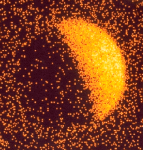 X-Raying the Moon
X-Raying the Moon
31.08.1995
Above is a picture of the Moon taken in X-rays by the Roentgen Observatory Satellite ROSAT in 1990. This famous picture shows three distinct regions: a bright X-ray sky, a bright part of the Moon, and a relatively dark part of the Moon.
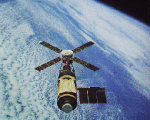 Skylab Over Earth
Skylab Over Earth
30.08.1995
Skylab was an orbiting laboratory launched by a Saturn V rocket in May 1973. Skylab was visited three times by NASA astronauts who sometimes stayed as long as two and a half months. Many scientific tests were preformed on Skylab, including astronomical observations in ultraviolet and X-ray light.
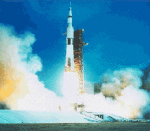 Saturn V: NASA's Largest Rocket
Saturn V: NASA's Largest Rocket
29.08.1995
Pictured, a NASA Saturn V rocket blasts off on July 16th, 1969 carrying the crew of Apollo 11 to the Moon. The Saturn V rocket was the largest rocket ever used by NASA, and the only one able to lift the large masses needed to land astronauts on the moon and returning them safely.
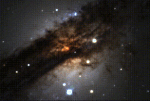 Dusty Galaxy Centaurus A
Dusty Galaxy Centaurus A
28.08.1995
One of the most unusual galaxies known, Centaurus A, is pictured above. Cen A is marked by dramatic dust lanes that run across the galaxy's center. These dust lanes are so thick they almost completely obscure the galaxy's center in visible light.
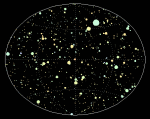 Gamma Ray Bursts from the Unknown
Gamma Ray Bursts from the Unknown
27.08.1995
Gamma Ray Bursts (GRBs) pose one of the greatest mysteries of modern astronomy. About once a day, the gamma-ray sky lights up with a spectacular explosion. No one knows what causes these explosions or even how far away they are.
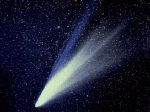 Two Tails of Comet West
Two Tails of Comet West
26.08.1995
Here Comet West is seen showing two enormous tails that wrap around the sky. The ion tale of a comet usually appears more blue and always points away from the Sun. The dust tail trailing the comet's nucleus is the most prominent.
 A World Explorer
A World Explorer
25.08.1995
Ferdinand Magellan was a world explorer. Many consider him the greatest navigator of Europe's 16th century age of sea going exploration and credit his expedition with the first circumnavigation of planet Earth. NASA...
 A Radar Image of Planet Earth
A Radar Image of Planet Earth
24.08.1995
This image of Mt. Rainier, Washington USA, planet Earth, was produced by the Spaceborne Radar Laboratory which flew on the Space Shuttle Endeavour in 1994. Radar, short for RAdio Detection And Ranging...
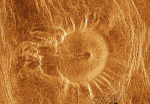 A Venusian Tick
A Venusian Tick
23.08.1995
Data from the Magellan spacecraft has shown the Face of Venus to contain a host of volcanic features. This image shows an example of a fairly common type of venusian volcanic feature. Known...
|
January February March April May June July August September October November December |
|||||||||||||||||||||||||||||||||||||||||||||||||